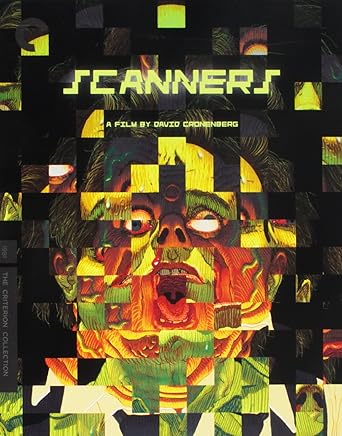Movie Review: Scanners (1981)
David Cronenberg’s Scanners (1981) is a cerebral sci-fi thriller that explores psychic warfare, corporate conspiracy, and body horror with haunting precision.
HORRORTHRILLER

★★★★★
Still one of the most unnerving sci-fi movies I’ve ever seen. Scanners gets under your skin and into your head.
Julian M.
Michigan
If you’ve heard of Scanners, chances are your brain immediately goes to that scene yes, the head explosion. It's one of the most iconic practical effects in horror history. But if that’s all you remember, you’re missing the real meat of what makes Scanners (1981) so strange, cerebral, and sneakily ahead of its time.
Directed by David Cronenberg, Scanners isn’t just a sci-fi horror film with telepathic warfare it’s a psychological thriller, a critique of corporate power, and a reflection on the loneliness of being different. It’s a slow-burn movie that combines the pulpy fun of mutant powers with Cronenberg’s signature obsession with the body and mind in conflict.
It’s weird, cold, occasionally stiff and totally unforgettable.
Not Just Another Sci-Fi Horror Flick
Most people label Scanners a horror movie, but that’s only part of the picture. This is really a noir-tinged espionage thriller set in a world where psychics (aka “scanners”) exist, and can manipulate minds, cause seizures, read thoughts and yes, make heads explode. But Cronenberg grounds it in something that feels clinical and almost bureaucratic.
The story follows Cameron Vale (Stephen Lack), a troubled man who discovers he’s a powerful scanner and is recruited by a shadowy company to stop a rogue scanner named Darryl Revok, played with icy menace by Michael Ironside. But like most Cronenberg tales, the more Vale digs into the conspiracy, the less clear the lines between good and evil become.
What makes Scanners unique is how it treats its psychic powers not as cool superpowers, but as a burden. Scanners hear every thought, feel others’ emotions, and suffer from a lack of control over their abilities. It’s isolating and that’s the point.
The Cronenberg Coldness (And Why It Works)
Here’s something a lot of reviews don’t talk about: Scanners is deliberately emotionless and that’s not a flaw. Cronenberg’s world is sterile, filled with glass-walled offices, clinical labs, and emotionally repressed characters. It reflects a world where corporations and institutions try to control the individual especially those who don’t fit into the system.
Cameron Vale isn’t charismatic. In fact, Stephen Lack’s performance has been criticized for being wooden. But in the context of Scanners, it works. Vale is someone whose entire life has been a blur of noise and confusion. He’s not supposed to be slick. He’s barely functional. Watching him slowly come into his own power, while retaining a sense of unease, is what gives the film its existential weight.
Meanwhile, Michael Ironside’s Revok is pure Cronenbergian terror intelligent, angry, and cold. He’s not a madman he’s a visionary. And that’s what makes him terrifying.
The Science Fiction Behind the Horror
What often gets missed in mainstream reviews is how Scanners quietly explores themes of eugenics, medical ethics, and pharmaceutical abuse. ConSec, the shadowy corporation at the heart of the film, is experimenting on psychics, trying to weaponize them for profit. There are echoes here of MK-Ultra, of real-world experiments where governments sought to control the mind through drugs and conditioning.
Cronenberg isn’t just spinning a yarn about mutants. He’s warning us about what happens when science loses its soul when people become data points, and empathy is overridden by ambition.
It’s classic Canadian sci-fi paranoia, delivered with a scalpel instead of a sledgehammer.
Visual Effects That Still Shock
Yes, we have to talk about the head explosion again because even today, over 40 years later, it still holds up. Created by legendary special effects artist Dick Smith, the scene is visceral, sudden, and perfectly timed. But it’s not just gore for gore’s sake. It’s the moment the film tells you, This world is dangerous. These people are weapons.
Beyond the gore, there’s something deeply disturbing about the film’s depiction of psychic combat. Veins bulge, eyes shake, and people convulse in eerie silence. It’s not flashy it’s painful. These aren’t laser beams or telekinetic tricks. It’s a war of will, and Cronenberg shoots it like a physical, exhausting ordeal.
Pacing and Performances: Not for Everyone
Let’s be honest Scanners is a slow movie. It takes its time building tension, and the performances can feel flat to modern audiences. There are long scenes of exposition and the dialogue sometimes veers into clunky territory.
But for fans of cerebral sci-fi and body horror, that pacing adds to the unease. The film doesn’t spoon-feed you. It builds an unsettling world and asks you to sit with it. The coldness, the silence, the sudden bursts of violence they’re all part of the experience.
Final Thoughts from BoxReview.com
At BoxReview.com, we have a soft spot for films that take big swings and Scanners definitely does that. It’s part spy thriller, part medical horror, and part philosophical treatise on identity and control.
It’s not a film you watch for comfort. It’s a film you watch to feel unnerved, intrigued, and just a little grossed out. But more than that, it’s a movie that lingers not because of what it shows, but because of what it implies.
If you’re a fan of David Cronenberg, slow-burn sci-fi, or films that explore the darker corners of the mind, Scanners deserves a spot on your watchlist preferably with the lights off and the volume up.
Box Review
Stay connected and follow us on social media for the latest reviews, movie highlights, and behind-the-scenes content.
© 2025-2030. All rights reserved.
Privacy & Legal
Join Our Newsletter!
RSS Feed
Built with ❤️ by CupidName.com

